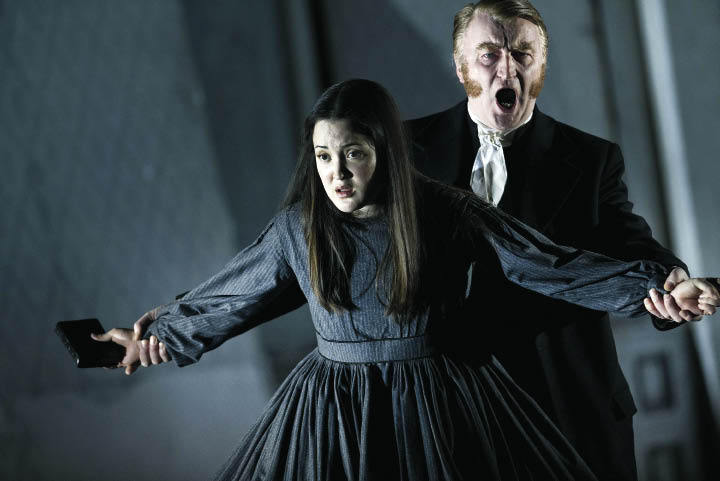Lucia di Lammermoor
English National Opera, in rep until 26 February
When David Alden’s production of Donizetti’s Lucia di Lammermoor was first staged by ENO two years ago it was so beset by cast illnesses that it was difficult to tell to what extent the director’s intentions were executed. Even so, the musical side of things, under Paul Daniel, was admirable. But in this first revival it was clear from the start that both musically and dramatically everything had been prepared with great care, and that, however one might react to the peculiar interpretation which Alden has imposed on it, there would be no doubt that we were seeing a carefully thought-out reading of a work which has often been treated as a mere vehicle for a coloratura soprano, with a great ensemble at its centre, but no serious dramatic weight.
Seven years ago, the Royal Opera had the same idea, but that production was close to being a fiasco. Christof Loy saw the opera as a study of a society dominated by male values of aggression and administration, with Lucia as a potentially redemptive figure, attempting to introduce love and warmth, but failing tragically. Alden’s take on the villainous males of Lucia is quite different. He, more plausibly, sees it as an examination of family values when the family concerned is in very poor shape. So far so good. The Ashton family has fallen on hard times, as is indicated — Alden evidently doesn’t expect audiences just to take anyone’s word for it — by the physical collapsing of Ravenswood Castle, which they commandeered. A collection of locals, possibly modelled on Courbet’s hideously indifferent bystanders in his great ‘The Burial at Ornans’, looks in through the shattered windows. Lucia, despite her daily illicit meetings with Edgardo, enemy of her family, is still a child, nursing a doll and sleeping in a cot, where her brother Enrico sexually abuses her. She seems to have a private world, figured as a small stage with a curtain, though the exact significance of that part of Alden’s scheme escaped me. When she and Enrico have a serious bust-up, her toys get thrown around, her little wooden horse is sent shooting across the stage. Yet this is the passionate woman who later kills her husband and is madly in love with the hero Edgardo.
My confusion about how seriously Alden means us to take Lucia is compounded by the melodramatic poses which he gets his characters to strike, often at moments of highest tension. No brow is left unclutched, the very minor character Normanno, a retainer of Enrico’s, is unfairly made into the piece’s arch-villain, and indulges in an interminable bout of sinister mirth. There could possibly be a point here about the extent to which emotions become phoney in family crises, especially quarrels, with the members of the family adopting routine attitudes — except for the child-bride who has not learnt to fake things. But if that is the idea, it remains so partially realised that only an act of creative criticism can urge it towards completeness. And I am still bewildered about the motive for making Lucia an infant. Anna Christy, who also sang the role in 2008, has a girlish voice, and everything is done to make her seem an Alice figure; she even enters on her knees, so that, wearing a full-length dress, she seems to be a dwarf as well as a child. It’s impressive how, despite these impediments, Christy manages to be moving, and not only vocally. She does the huge mad scene, which even in its ‘authentic’ version, and with the accompaniment of a glass harmonica, is still a bit of a bore, with great conviction.
In fact, everyone acts with conviction, including Brian Mulligan as the dastardly Enrico. He has a rich baritone, and makes the character almost three-dimensional. All the singing, and the wonderfully incisive conducting of Antony Walker, result in a Lucia in which there are almost no longueurs. For the first time I was persuaded that this is a work of consistent power and interest. Clive Bayley brings Raimondo, the chaplain, to vivid life too. But of course the other tragic figure is the doomed Edgardo, and for all the plangency of his voice, and the energy of his acting, Barry Banks obstinately doesn’t come across as Byronic. Alden requires him to do many implausible, foolish things, and he complies, and in the final scene — the most moving in the opera — he sings so passionately that I was at last won over, but I wanted to be much sooner. If I heard a recording of this performance I’m sure I would be, for it was one of the finest things ENO has managed musically for a very long time.






Comments